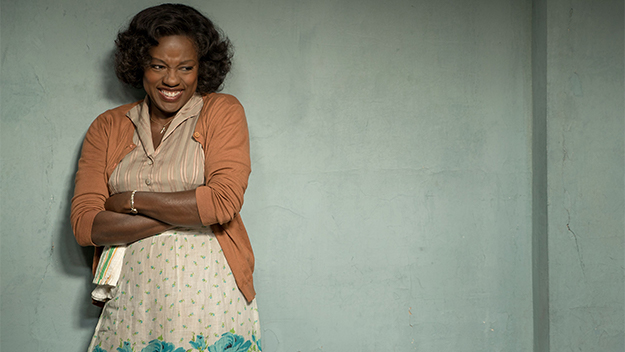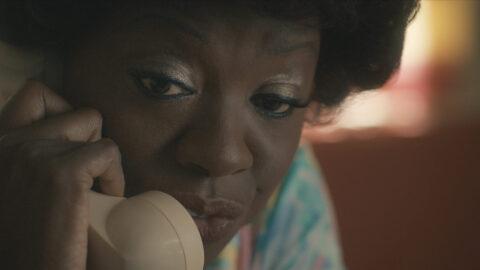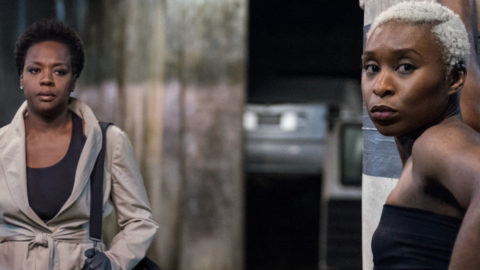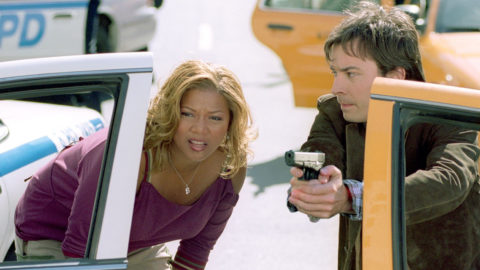Eyes on the Prize
This article appeared in the April 21, 2023 edition of The Film Comment Letter, our free weekly newsletter featuring original film criticism and writing. Sign up for the Letter here. For more on the 48th Chaplin Award, visit Film at Lincoln Center.

You have to work to ignore Viola Davis.
Over her multi-decade career, the 57-year-old EGOT winner has developed a reputation for holding audiences rapt, whether it be on the stage or the screen, in parts large or small. The word that follows her from job to job and character to character is “intensity.” Being unable to—or for that matter, wanting to—tear one’s eyes from her is terrifically clarifying. Someone who tries to avert their gaze from Davis is saying far more about themselves than they could ever say about her.
Born on the Singleton Plantation in St. Matthews, South Carolina to the children of poor Black sharecroppers, Davis carries within herself America’s long, complicated legacy of enslavement, as well as its ongoing fight for freedom. Though her parents moved to Central Falls, Rhode Island when she was a toddler, Davis is very much a daughter of the American South, whose experiences have been shaped by the darkness of her skin and the tightness of the curls in her hair. The childhood of poverty, abuse, and invisibility she writes of in her 2022 memoir, Finding Me (the audiobook recording of which netted her a Grammy Award), reveal a life story that could easily come from a play by August Wilson. But hers is also a tale of triumph, of overcoming odds and learning to love herself through her remarkable talent as an actor. To turn away from Davis, to look away from all that she evokes and represents, is to avoid facing the past and present of this country.
Fortunately, the vision of Film at Lincoln Center is in no need of adjustment: the organization has rightfully chosen Davis as this year’s Chaplin Award honoree. The distinction formalizes something many of us knew from the moment we saw Davis as Moselle Miller in Steven Soderbergh’s steamy crime caper Out of Sight (1998): that she is an undeniable force in American cinema. That film, the first theatrical title to feature Davis in a named role, tells the story of a charismatic bank robber (George Clooney) and the federal agent whose attention he’s captured (Jennifer Lopez). When Lopez’s character comes looking for one of Clooney’s old prison contacts in Detroit, she’s greeted by Davis’s Moselle. Brandishing a cigarette and an air of pride and suspicion, Moselle gives her guest a quick, cool once-over that declares, wordlessly, that she’s not afraid of this tidy woman on her doorstep. Though she’s on screen for a mere two minutes, Davis leaves an indelible impression as a woman whose sardonic exasperation at her lot—her dog’s been run over by a car, her partner is a good-for-nothing, and she desperately needs grocery money—never gives way to miserablism.
Soderbergh had hired Davis on the advice of casting director Francine Maisler, the same woman who spotted Lupita Nyong’o and sent her to Steve McQueen for 12 Years a Slave. “My recollection is that this was not a difficult or belabored decision at all,” Soderbergh said during a recent phone call. “None of what’s happened to Viola has been a surprise to me. She immediately presented as someone you couldn’t take your eyes off of. If she’s in the frame, she is the thing that you want to look at. It’s this unique combination of intelligence and talent.”
Years later, Davis and Lopez would work together again on Lila and Eve (2015). Lopez also contributed to the team effort of writing and rewriting the new film Air, in which Davis plays the mother of Michael Jordan. When director/producer/star Ben Affleck was putting together the film, which tells the story of how the history-making partnership between Nike and Jordan came about, the basketball legend specifically asked that Davis be cast in the role of his mother.
Like Bette, the 1989 Chaplin honoree with whom she shares a surname, Davis’s power simply cannot be denied. Both stars are filled with funk, sprite, and an irrepressible need to do what’s right. In Viola’s case, that on-screen force derives in part from her background as a very specific type of American artist: the August Wilson–trained actor. What’s evident throughout Davis’s work, on both stage and screen, is a through line of Wilsonian rigor, as clear and identifiable as the Shakespearean background of great British actors from Sir Laurence Olivier to Dame Judi Dench, who have fashioned themselves into masterful vessels of the words and ideas of the Bard.
Davis studied acting in the college preparatory program Upward Bound, then theater at Rhode Island College—where the student body was mostly white at the time—and later at Juilliard. One of her earliest professional jobs was in a 1989 Trinity Repertory Company production of Wilson’s Joe Turner’s Come and Gone in Providence, Rhode Island. In 1996, she made her first Broadway appearance as Vera in the playwright’s Seven Guitars, directed by Lloyd Richards. Since then, she’s become the first lady of Wilson adaptations, starring frequently in stage and screen productions of his work. Her three Tony Award nominations to date were all for roles in Wilson plays, and she’s won twice, for her turns in King Hedley II (2001) and Fences (2010).
Just as cinema has its movements—French New Wave, New Hollywood, the Golden Age—so too does American theater. Wilsonism is one such movement. It bears some similarities to the L.A. Rebellion, which was started by Black UCLA film students and included Julie Dash, Arthur Jafa, Charles Burnett, and Haile Gerima. At the center of both Wilsonism and the L.A. Rebellion is a tacit acceptance of the worth of Black Americans and the experiences that inform their art. Both movements are about doing the best with the least, and finding beauty and creativity in lack. This artistic philosophy is highlighted in James D. Stern and Fernando Villena’s documentary Giving Voice (2020), executive produced by Davis, which follows a group of Black youths who use Wilson’s plays to find themselves.
Both movements are also led by Black artists who refuse to let the audience forget that they are Black. As Davis details in Finding Me, this did not come easily to her as a young actor; she felt pressure, in those early days, to erase her identity to prove her worth as a performer. “There’s a bartering, desperation factor attached to that. Let me prove to you that I have talent instead of just, being,” Davis wrote. “Forget about the dark-skinned girl who just walked into the audition room. Let me use my training and technique to make you ‘forget’ that I’m Black. . . . White students just had to show up and be good. There was no transforming to make you believe that this Rhode Islander could actually be Russian in a play by a Russian playwright. They simply had to be, well, white. This obstacle would be the four-hundred-pound gorilla that would constantly inhabit the various rooms I entered throughout my life.”
What Wilson did in his theater work was obviate the four-hundred-pound gorilla that has loomed over Davis and countless other Black artists. In his plays, Blackness is an asset, not an obstacle. A classic Wilson production is one that sees itself as part of the community it is depicting. There is a thread of uplift, but not in a way that evokes the snobbery or elitism of W.E.B. Du Bois’s “Talented Tenth.” It is grounded in an acceptance of Black people as they are, rather than an effort to make them visible, respectable, or palatable in the eyes of white people. When you grow up, like Davis, constantly subject to the shame of poverty inflicted by racial capitalism, there are few arenas that value such defiant self-acceptance. The plays of August Wilson do. As she writes in Finding Me of her experience acting in Seven Guitars: “[Vera] had been dumped by her boyfriend, Floyd Barton, who went to jail and while in jail, the song he recorded hit it big. Now he was out and wanted me by his side. It was a beautiful scene of hurt, pain, longing, love. It was me. It didn’t require much for me to tap into that part of myself.”
Wilson’s character-driven stories derive their power from their ensembles, and from the way they balance the rigorous formal ideals of narrative theater with opportunities for performers to take the spotlight. Once you can comfortably inhabit the playwright’s words with truth, everything else is gravy. An entire world opens up, in the same way the 12-bar blues provides a foundation for the boundless imaginations of everyone from Ma Rainey to Miles Davis, Sarah Vaughan to Charlie Parker. That balance, between preparation and freedom in performance, jumps out from Davis’s screen and stage portrayals of Rose Maxson, the Fences heroine whom the actor has come to define. The play is about a Black family living in 1950s Pittsburgh, where Wilson grew up, and the ways in which their professional aspirations are suffocated by the realities of Jim Crow America. The story follows Rose as she struggles to balance the needs and egos of the two men in her life—her husband, Troy, and their son, Cory—and eventually discovers that Troy has fathered a daughter with another woman who has died in childbirth, leaving the infant motherless. Davis first appeared as Rose in the 2010 Broadway revival of Fences, directed by Kenny Leon and co-starring Denzel Washington, and played her again in the 2016 film adaptation directed by Washington.
“My God, Fences,” director Gina Prince-Bythewood, who worked with Davis on The Woman King (2022), said in a phone interview. “The fact that you can show a scene [from Fences] completely out of context and it can move you to tears is a stunning thing.” In one such moment in the film, Rose confronts Troy about his affair. She is frustrated and angry, and Davis unleashes all that Rose has been swallowing and sublimating through a veil of unabashed tears and snot. It’s emblematic of the lack of vanity Davis brings to her work. She’s never been afraid to face a camera with no makeup and mussed-up hair, to go to any lengths to tap into the depths of the pain her characters shoulder. “I can’t think of a better cinematic acting moment, I really can’t,” Prince-Bythewood said. “It is everything we chase as directors and artists and filmmakers—that truth. I don’t know how she does it, but it is absolute truth captured on film.” If Davis can sometimes seem like a “surreal empath,” Prince-Bythewood was careful to insist that her performances are equal parts gift and grind. “People assume she just steps on set and is great. But having worked with her, I’ve seen how much work she puts in before, so that when she’s on set, you get that effortless feeling.”
Davis’s early film career is dotted with moments like these—her friend Meryl Streep found her revelatory in Doubt (2008), the film that garnered Davis her first Academy Award nomination. She later won a Best Supporting Actress Oscar for her performance in Fences, but for many, her breakout role was Aibileen Clark in The Help (2011), a film about a white writer, played by Emma Stone, who documents the experiences of Black maids in the Jim Crow South. With that performance, Davis joined a tiny club of Black actors who have been nominated for the Academy Award for Best Actress (only one Black woman, Halle Berry, has ever won it). Truth-teller that Davis is, she admitted to Vanity Fair in 2018 that she regretted making the film. “I just felt that at the end of the day that it wasn’t the voices of the maids that were heard. I know Aibileen. I know Minny [played by Octavia Spencer]. They’re my grandma. They’re my mom. And I know that if you do a movie where the whole premise is, I want to know what it feels like to work for white people and to bring up children in 1963, I want to hear how you really feel about it. I never heard that in the course of the movie.”
To admit this on the record was bold. White people, even nice white people, tend not to take kindly to these sorts of criticisms. There is a racist expectation that an overqualified Black performer who has won an Oscar after years of being shunted into bit parts should be grateful to the people finally waking up to the obvious. But by 2018, Davis had learned a lesson that Wilson’s canon embraces without qualification or apology: that to be Black and talented is, in fact, enough. That knowledge has blossomed into a new phase for Davis as a leading woman. She was commanding as a brainy Chicago crime wife in Widows (2018); mesmerizing as the stubborn, surly Mother of the Blues in Ma Rainey’s Black Bottom (2020); and formidable as the grizzled, machete-wielding Nanisca in The Woman King, leader of an African tribe of female Agojie warriors attempting to beat back encroaching European slave traders.
But before all that, Davis took a detour to Shondaland. Created by Peter Nowalk and produced by Shonda Rhimes, the series How to Get Away with Murder (2014-20) starred Davis as Annalise Keating, a whip-smart, sexy, queer law professor who becomes embroiled in multiple murder mysteries. Leading a hit network television show made Davis a household name, especially when, in 2015, she became the first Black woman to win the Emmy for Outstanding Lead Actress in a Drama Series. Davis quoted Harriet Tubman in her acceptance speech, and delivered two of the most memorable lines of the evening. “Let me tell you something, the only thing that separates women of color from anyone else is opportunity,” Davis said. “You cannot win an Emmy for roles that are simply not there.”
Ever the pathbreaker, Davis decided to take the lead in creating those opportunities for herself and other Black women. The Woman King, Davis’s most ambitious project to date, is a perfect example: she was not just the star of the film but also a producer, along with her husband, Julius Tennon. The two of them started their own production company, JuVee, in 2011, in part because no one aside from Shonda Rhimes was banging on Davis’s door to offer her roles—something she’s attributed to both racism and colorism. “Even after two Oscar nominations, one for best lead actress, I was not getting the same roles as my white or even some of my Black counterparts,” she writes. “My career mirrored my childhood. My Blackness was as much an issue on the stage and screen as it was in my childhood.” There are other barriers, too, that Davis has striven to break down in the producer’s seat: The Woman King’s Nanisca was originally written as a younger woman in her forties, but Davis fought to have the character’s age match her own. The result is a heroine who struts with the confidence of a veteran general, with the authority of battle scars, and with the hard-earned wisdom that Davis herself embodies.
Like Nanisca, Davis is a survivor. “She inspires in such a beautiful way,” said Prince-Bythewood. “Actors are excited to work with her because she is giving as much as she’s getting. But also, she’s still Viola Davis, and so often, it’s like sitting at someone’s feet and just learning and ingesting incredible things, whether it be craft, whether it be about the business, whether it be about life . . . She is about the film, and not every star is like that. She understands that the stronger the ensemble, the stronger the whole.” Wilson, who died in 2005, and whose work provided the path for Davis to find her feet, would surely be proud.
Soraya Nadia McDonald is the winner of the George Jean Nathan prize for dramatic criticism, a finalist for the Pulitzer Prize in criticism, and the runner-up for the Vernon Jarrett Medal for outstanding reporting on Black life.






